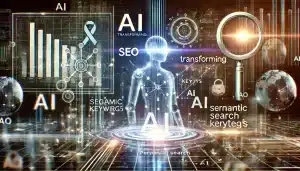Introduction
Search Engine Optimization (SEO) is undergoing a seismic transformation, driven by the rapid integration of artificial intelligence (AI). As search engines evolve to become smarter and more user-focused, businesses must rethink their SEO strategies to remain competitive. AI not only refines search algorithms but also shifts the focus from keyword-centric approaches to a deeper understanding of context, semantics, and user intent. This article explores how AI is reshaping SEO, its implications for content optimization, and strategies to future-proof your SEO efforts.
How AI is Transforming SEO
AI is at the core of modern search engines, enhancing their ability to understand user behavior and intent. Search engines like Google use AI-driven systems such as RankBrain and BERT to analyze and deliver results that match user queries more effectively.
RankBrain: Revolutionizing Search
RankBrain, Google’s AI-powered algorithm introduced in 2015, analyzes how users interact with search results. It interprets ambiguous or complex queries by identifying patterns and predicting user intent, ensuring more accurate results. This has made traditional keyword stuffing obsolete, as RankBrain prioritizes relevance and context over superficial keyword usage.
BERT: Understanding Context
The Bidirectional Encoder Representations from Transformers (BERT) algorithm focuses on understanding the context of words in a search query. For example, BERT can differentiate between “bank” as a financial institution and “bank” as the side of a river based on the surrounding words. This shift toward semantic search compels businesses to create content that aligns with how users naturally speak and search.
AI’s ability to improve search algorithms means businesses must prioritize user-centric strategies, such as addressing intent and providing comprehensive, high-quality content.
Content Optimization with AI
Creating high-ranking content today requires more than just inserting keywords—it demands relevance, quality, and engagement. AI tools have emerged as indispensable allies in achieving these goals.
How AI Tools Optimize Content
AI tools like Surfer SEO, Frase, and Clearscope analyze top-ranking pages for a given keyword, providing actionable recommendations for optimization. These tools evaluate:
- Content gaps: Identifying missing topics or subtopics.
- Keyword usage: Ensuring the inclusion of relevant primary and secondary keywords.
- Readability and structure: Suggesting ways to improve clarity and engagement.
For example, AI-driven systems can analyze search engine results pages (SERPs) to uncover why certain pages rank higher, offering suggestions to enhance your content’s authority and relevance.
Natural Language Processing (NLP) in Content Creation
AI leverages natural language processing (NLP) to ensure content is not only optimized for search engines but also tailored for human readers. NLP algorithms evaluate sentence structure, tone, and keyword placement to create content that resonates with users. This ensures your content aligns with search intent, a crucial factor in modern SEO.
Additionally, machine learning enables AI tools to predict the content formats and types most likely to perform well for specific queries. This data-driven approach ensures that your content is always aligned with evolving search engine expectations.

Personalized Search and User Experience
AI is redefining personalization in SEO. Search engines like Google and Bing now tailor search results to individual users based on factors such as:
- Search History
- Location
- Device usage
- Preferences and behavior
Why Personalization Matters
When search engines deliver personalized results, businesses must focus on creating content that appeals to specific audience segments. For example:
- E-commerce websites can use AI to recommend products based on past purchases.
- Content creators can develop localized blogs to target specific regions.
By leveraging AI to analyze user data, businesses can craft personalized experiences that not only improve rankings but also drive conversions.
Dynamic Content and AI
Dynamic content—content that changes based on the user—has become a key trend in personalization. AI-driven systems allow websites to display tailored recommendations, ensuring visitors see the most relevant products, articles, or offers.
For instance, AI tools like Dynamic Yield and Adobe Sensei analyze user behavior in real time, dynamically adjusting website elements to maximize engagement and satisfaction.
Voice Search and AI
The rise of voice search is reshaping how people interact with search engines. With the growing adoption of voice-activated devices like Amazon Alexa, Google Assistant, and Siri, optimizing for natural language queries has become essential.
How AI Powers Voice Search
Voice search relies on AI-driven natural language understanding (NLU) to interpret conversational queries. Unlike traditional text searches, voice searches often involve longer, more conversational phrases. For example:
- Text search: “best Italian restaurant NYC”
- Voice search: “Where can I find the best Italian restaurant near me?”
Optimizing for Voice Search
To optimize for voice search, businesses should:
- Use conversational language: Write content in a natural tone that mimics how people speak.
- Focus on question-based keywords: Create content that answers common questions starting with “what,” “how,” or “where.”
- Leverage local SEO: Optimize location-based queries to capture nearby voice search traffic.
AI tools like Answer The Public can help identify long-tail keywords commonly used in voice search, ensuring your content aligns with these emerging trends.
Future-Proofing Your SEO Strategy with AI
The SEO landscape is constantly changing, and businesses that fail to adapt risk falling behind. Embracing AI-driven tools and strategies is essential for staying competitive.
Invest in AI-powered analytics.
AI analytics tools, such as Google Analytics 4 and SEMrush, provide real-time insights into website performance. These tools track:
- Keyword rankings
- User engagement metrics (bounce rate, time on page, etc.)
- Conversion rates
By analyzing this data, businesses can identify what’s working and refine their strategies for better results.
Keyword Research with AI
AI tools have revolutionized keyword research by analyzing user behavior and predicting trends. Platforms like Ahrefs and Moz use machine learning to uncover high-potential keywords and long-tail variations. This ensures businesses target the most relevant and impactful search terms.
AI in Content Creation
AI content generators like ChatGPT and Jasper can assist in creating high-quality content efficiently. While human oversight is essential, these tools can save time and ensure your content is optimized for both search engines and readers.
Embracing AI for Competitive Advantage
Staying Updated with Algorithm Changes
Search engine algorithms are constantly evolving, with AI at the forefront of these updates. To stay competitive, businesses must:
- Monitor algorithm changes (e.g., Google’s core updates).
- Adjust strategies to align with new ranking factors.
- Leverage AI tools to quickly adapt to changing trends.
The Role of Structured Data in AI
Structured data (schema markup) helps search engines understand your content better. AI tools can automate schema implementation, ensuring your website is optimized for rich snippets, FAQs, and featured snippets—all of which are crucial for SEO success.
The Future of AI in SEO
The future of AI in SEO is poised to bring even more transformative changes. Emerging trends include:
- Hyper-Personalized Search: Search engines will continue to deliver results tailored to individual users with unprecedented accuracy.
- AI-Powered Visual Search: Tools like Google Lens will make image and video optimization as critical as text-based SEO.
- Integrated AI Experiences: Businesses will increasingly use AI to provide seamless user experiences across platforms and devices.
As AI continues to evolve, businesses that embrace these advancements will stay ahead of the competition.
Conclusion
AI is undeniably shaping the future of SEO, driving a shift from traditional, manual methods to more sophisticated, data-driven approaches. By leveraging AI, businesses can enhance their SEO strategies, create personalized and engaging content, and future-proof their operations against evolving search engine algorithms. In the ever-changing digital marketplace, embracing AI is no longer optional—it’s a necessity for businesses aiming to maintain a competitive edge.
Frequently Asked Questions (FAQs)
1. How is AI transforming SEO strategies?
AI is revolutionizing SEO by improving search algorithms, understanding user intent, and personalizing search results. Tools powered by AI analyze data, predict trends, and optimize content, helping businesses align with user needs and search engine expectations.
2. What are RankBrain and BERT, and why are they important for SEO?
RankBrain and BERT are Google’s AI-driven algorithms:
- RankBrain focuses on understanding user intent and ranking relevant content.
- BERT emphasizes context and semantics in search queries.
Both prioritize quality, making user-focused content critical for SEO success.
3. How does AI assist in content optimization?
AI-powered tools like Surfer SEO and Clearscope help optimize content by analyzing readability, keyword relevance, and user engagement. They provide actionable recommendations to align content with search intent and boost rankings.
4. Why is voice search important, and how does AI contribute?
AI drives voice search by understanding conversational queries through natural language processing (NLP). Businesses can optimize for voice search by targeting long-tail keywords and creating content that answers common questions.
5. How can businesses future-proof their SEO strategies with AI?
Businesses can future-proof their SEO by:
- Using AI for keyword research, analytics, and content creation.
- Staying updated on AI-driven algorithm changes.
- Focusing on personalization, voice search, and emerging trends like visual search.



